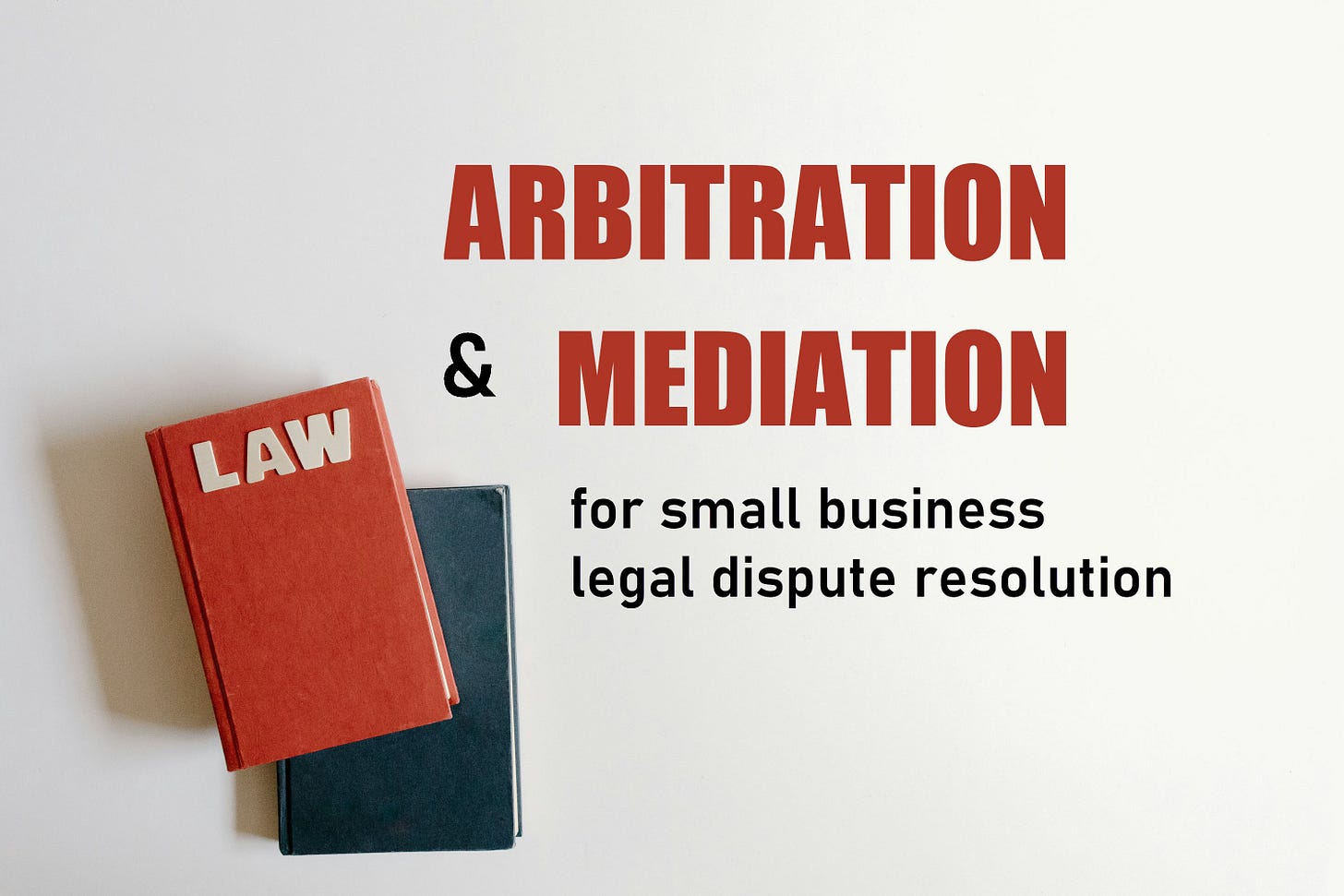Legal Disputes: Arbitration and Mediation Clauses Can Save Your A$$
Post #54: Avoid going to court for minor disputes with these dispute resolution methods.
Bootstrap Your Business is a Substack community dedicated to supporting new and aspiring business owners with the process of starting, setting up, and operating a small business.
Join me on this Journey with DIY instructional content, commonly used templates and reusable files, and coaching advice! It’s all here!
Go to my Substack Home Page for additional resources for entrepreneurs and solopreneurs: 👇
Did you know…?
✔️ Over 97% of commercial arbitration cases are resolved without a full trial.
✔️ Approximately 60% of arbitration cases are resolved without the issuance of an award, indicating that many disputes are settled before reaching a final arbitration decision.
✔️ 44% of cases that were resolved before reaching an award were settled early enough that no arbitrator compensation was incurred.
(source)
In this newsletter, I’ll cover the importance of reviewing your contracts, and making sure that there is an effective dispute resolution clause - such as arbitration or mediation - in order to manage disagreements without getting attorneys involved or having to go to court for minor disputes.
Specifically:
The importance of legal agreements for small business owners
Why many contracts default to litigation (i.e.: attorneys) in the event of a dispute
Why Arbitration and Mediation matter for dispute resolution
Arbitration and Mediation: what they are and how they work
What to look for in a contract before signing
How to protect yourself before signing a contract

👉 Also, be sure to check out these resources:
Bootstrap Your Business Workflow - a step-by-step guide with the links to all of the top daily posts that walk you through the process from scratch
BYB Book Recommendations - a collection of the best business books to help you on your entrepreneurial journey
BYB Alerts & News - urgent updates for self-employed and business owners - delivered to your inbox - so that you can be more prepared
BYB Documents - a repository of guidance for important business documents with instructions and guides to use them in your self-employment journey
📌 Caveat Emptor
As a business owner, I have had a lot of exposure to business-related contracts, and have learned many lessons along the way (too often by way of hindsight).
However, please keep in mind as you review this newsletter that:
I’m NOT an attorney, arbitrator, or mediator, and I have no formal legal education.
This is NOT an advertisement for any arbitration or mediation service.
This is NOT meant to serve as legal advice or legal guidance.
I am only sharing my experience — your circumstances and needs may differ.
This newsletter is based entirely upon my experience and research as an entrepreneur.
I’ve worked as a consultant with companies that offer arbitration and mediation services, and I wholeheartedly believe in the services that they provide — especially to small business owners who cannot afford to keep an expensive law firm on retainer.
If you are seeking guidance with any contract-related or legal decision, I encourage you to talk with a legal expert, or contact an arbitration and/or mediation service provider in your area for guidance with your unique situation.
Contracts & Legal Agreements
When you're a freelancer or small business owner, written contracts and legal agreements are your safety net. They define expectations, protect your work, and help to ensure that you get will paid.
But what happens when something goes wrong?
One of the most overlooked yet critical parts of a contract is the dispute resolution clause — specifically, whether it includes Arbitration or Mediation.
If it doesn’t, you could be setting yourself up for an expensive legal nightmare.
The Hidden Danger in Standard Contracts
Many contracts default to litigation in the event of a dispute, meaning that if an issue arises, lawyers get involved and the matter could end up in court.
For large companies with legal teams on retainer, this isn’t a problem. But for freelancers and small business owners, this can be an instant financial disaster.
Hiring an attorney for a business dispute can easily cost thousands (or even tens of thousands) of dollars.
Even if you're in the right, you might not be able to afford the fight.
Worse, some unscrupulous attorneys may escalate minor disputes to justify their fees.
Why Arbitration and Mediation Matter
Many contracts are written to protect the interests of the party drafting them — often a company with legal resources.
And when you are a small business, you may not have the legal or financial resources to protect yourself from legal disputes with larger firms (i.e.: such as your clients or prospective business partners).
You need to do your due diligence with reading the contract and making sure that there is a reasonable dispute resolution method that won’t land you or your business in a heap of trouble in the event of a disagreement (even if it’s minor).
What are Mediation and Arbitration?
Here are some very brief descriptions of what Arbitration and Mediation are so that you can get a foundation of understanding and do additional research to learn more on your own.
Mediation: A Low-Cost, Low-Stress Option
Mediation is a structured negotiation process where a neutral third party helps both sides come to an agreement.
It’s informal, cost-effective, and can resolve disputes without damaging business relationships.
Many conflicts arise from simple misunderstandings, and mediation provides a way to clear the air without legal escalation.
Arbitration: A More Predictable Alternative to Court
Arbitration is a private dispute resolution process where a neutral arbitrator (or panel) makes a decision after hearing both sides.
While more formal than mediation, it’s often faster and significantly cheaper than going to court.
Arbitration decisions can be binding or non-binding, depending on how the contract is written.

What to Look for in a Legal Agreement
Before signing any contract (or “agreement”), check the dispute resolution section.
Here are key elements you want to see:
Mandatory Mediation First. This ensures both parties attempt to resolve the issue before legal action.
Arbitration Instead of Litigation. If mediation fails, arbitration is usually the next best step before going to court.
Location and Jurisdiction. Contracts often specify where disputes must be handled. If it’s across the country, that’s a red flag.
Cost-Splitting Agreements. The contract should clarify how arbitration or mediation costs are shared.
Many contracts default to litigation as the primary form of dispute resolution, requiring attorneys to get involved and taking conflicts straight to court.
Protect Yourself Before You Sign
Many business owners assume that contracts are non-negotiable, but that’s rarely the case.
📌 If a contract does not include an arbitration or mediation clause (or a reasonable dispute resolution method), you have the right to ask for one to be added before signing.
When reviewing a contract, consider requesting the following:
A mediation-first clause: This ensures that both parties attempt to resolve disputes amicably before escalating.
A clear arbitration provision: If mediation fails, arbitration should be the next step rather than an immediate lawsuit.
A defined arbitration provider: Naming a reputable organization like the American Arbitration Association (AAA) or JAMS can ensure a fair process.
Cost-sharing terms: The clause should specify whether the parties split arbitration fees or if one party covers them.
Jurisdiction preferences: The contract should specify where disputes will be handled to avoid costly travel or legal complications.
By negotiating for these clauses upfront, you can protect yourself from unnecessary legal costs and lengthy court battles.
Contracts should serve both parties fairly, and requesting a dispute resolution clause is a reasonable step to safeguard your business.
My Advice to You…
The best time to plan for a dispute is before there is one.
Before you get too excited about working with a new client and blindly sign a contract, you should read the contract carefully and never be afraid to push for fairer terms.
Your future self will thank you.
If you are looking for help with this topic, and you’re not sure where to start,
feel free to reach out to me directly.
Paid Subscribers are eligible for a FREE 30-minute consultation.
I still have a couple of Coaching slots open!
If you enjoyed reading this newsletter, and aren’t ready to become a subscriber, you can leave a tip. :-)
Share your thoughts in the comments if you found something useful or want to add more color to the topic.




